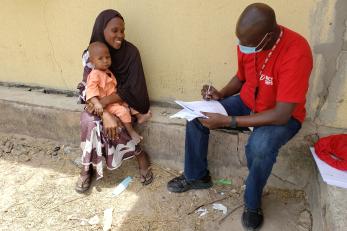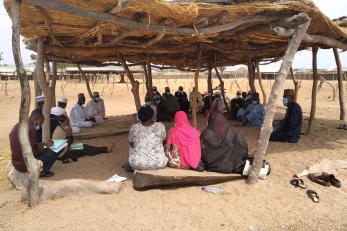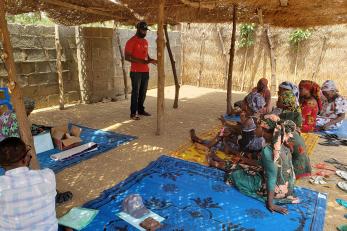Addressing the impacts of climate change in resource based conflict-affected communities

How do peacebuilding programs support local communities grappling with shared natural resource conflicts to collectively understand and respond to the impacts of climate change on conflicts and broader livelihoods associated with shared resources?
This conversation remains a resounding theme within contemporary peacebuilding programs that aim to mitigate resource-based conflicts in local communities, especially over shared land and water resources. It is almost impossible to deny the increasingly damaging effects that climate change is waging on farming and herding communities, particularly in accessing and using shared natural resources. The contention to control and use land and water resources increases violent conflicts, destroys relationships, and undermines social cohesion efforts by government authorities and humanitarian agencies, such as Mercy Corps.
While some of these resource-based tensions are associated with cultural practices or have economic, political, or social dimensions, the effects of environmental degradation and climate change on conflicts, in general, are overlooked. Overwhelming evidence indicates that climate change and variability escalate the scarcity of shared natural resources, especially within communities that depend on land and water for their livelihoods. This scarcity happens due to insidious changes and variability in climatic conditions that influence the amount, quality, and pattern of rainfall, prolong flooding and droughts, and reduce the availability of arable land for farming and grazing purposes, thereby creating stress for already vulnerable communities that rely on land and water resources for livelihoods.
Dialoguing through natural resources mapping
These varying issues are real and impact farmer and herder communities in distinct ways. The International Organization for Migration, Search for Common Ground and Mercy Corps, through the EU-funded COMITAS project in Nigeria’s Northeast state of Adamawa, are promoting peacebuilding, conflict resolution, enhanced natural resource management and social re-orientation in farmer and herder communities. The project is empowering them to recognize how diminishing natural resources, and the conditions that deteriorate them, affect conflict escalation and social cohesion.

Although the operationalization of early warning mechanisms and the development of project communities’ negotiation capabilities are vital to deal with the conflict dimensions of shared resources, empowering them also to understand the influence of other external tacit factors on natural resource conflicts will deepen community awareness and response to the mitigation of resource-based conflicts. Besides, project communities’ awareness about climate change as a threat-multiplier and its role in intensifying the pre-existing socio-economic, political, and environmental challenges that communities already face enhances their abilities to build resilience and implement strategic actions to prevent further impacts of climate change on their communities, livelihoods and relationships.
Mercy Corps-led natural resource mapping in the COMITAS project communities enabled farmer and herder groups to visualize the complex relational patterns between their communities. It also highlighted how climate change stiffens grievances between farmer and herder communities, overwhelms their coping capacities, spurs forced migration, and sustains overlapping contests for ownership, control and use of land and water resources.
Participants in the natural resource mapping who previously recognized changing climatic conditions as “an act of God” are beginning to acknowledge these changes as a combination of human and industrial activities that deplete the environment, including shared natural resources. Some of these activities include the felling of trees that serve as windbreaks and prevent desertification, bush burning, and the use of chemicals that contaminate land and water.
Even though the natural resource mapping revealed that climate change stressors are unlikely to escalate conflicts in themselves, a steady culmination of environmental problems, poor natural resource management, and low awareness may trigger instability. In essence, poor community knowledge about climate change and its varying effects on land and water resources can worsen vicious circles of conflicts and failure of affected farmer and herder communities to adapt to climate change.
Through developed negotiation capacities and participatory natural resource mapping that leaves no community member behind, farmer and herder communities of the COMITAS project are better placed to negotiate natural resources and brainstorm on concrete plans that sustainably helps them to repair their social relationships, meet their different needs, and mitigate climate change.

Innovative approaches for resilience and sustainability
As an innovative method of supporting project communities with climate resiliency, Mercy Corps will utilize information from the natural resource mapping and community action plans to develop Climate Resilience Hubs (CRHs) that will enable farmer and herder communities to access timely weather information that allows them to plan agricultural activities and mitigate climate shocks.
This collaborative innovation will form part of community action plans that will be implemented with other mutually beneficial concrete solution projects to address the shared resource needs of farmer and herder groups across project communities in Adamawa State. Mercy Corps will support communities to organize a series of consultative and joint dialogues to reach agreements on these mutually beneficial projects and identify the locations of the CRHs. This approach to consolidating peacebuilding effectiveness and climate change mitigation empowers these communities struggling with resource-based conflict and climate vulnerabilities to address the underlying drivers of conflicts. Empowering them with the skills to transform relationships on the access and use of shared natural resources, and facilitate collaborative discussions around the most appropriate methods to address the reduction in scarce natural resources and other adverse human activities that deplete the environment.
It also ensures redress of underlying social inequalities that exist within farmer and herder communities – including between men, women, youths, and persons living with disabilities – and strengthens the agencies of other marginalized groups to contribute to climate change mitigation efforts. This type of inclusive thinking will lead to the implementation of stepwise approaches – one that is embedded in joint analysis and collaborative implementation of actions.
For peacebuilding practitioners implementing programs that have intersections of social cohesion, conflict resolution and natural resource management, we must deliberately ensure that climate change is mainstreamed into our conflict and context analyses, including the scoping and design of activities.
This approach requires that we engage with relevant community groups to map available shared natural resources and strategize on the most effective ways to improve relationships around these resources and mitigate climate stressors that impact their continuous use while also sharing the lessons learned across the community of peacebuilding practice. These actions are currently operationalized in the COMITAS project in Adamawa State and provide learning opportunities for other programs with the same objectives.
Evidently, while we must acknowledge that addressing climate change and sustaining collaborative natural resource management in conflict environments is an inherently daunting task, particularly within farmer and herder groups, peacebuilding practitioners and climate change experts must educate communities about climate change realities. These collaborative steps will further increase community awareness on climate change and the legitimacy of climate resiliency actions and plans because they will be locally-owned and locally-driven by the affected communities themselves.
By Tog Gang, Program Manager, COMITAS, and Ephraim Bassey Emah, Natural Resource Management Advisor, COMITAS